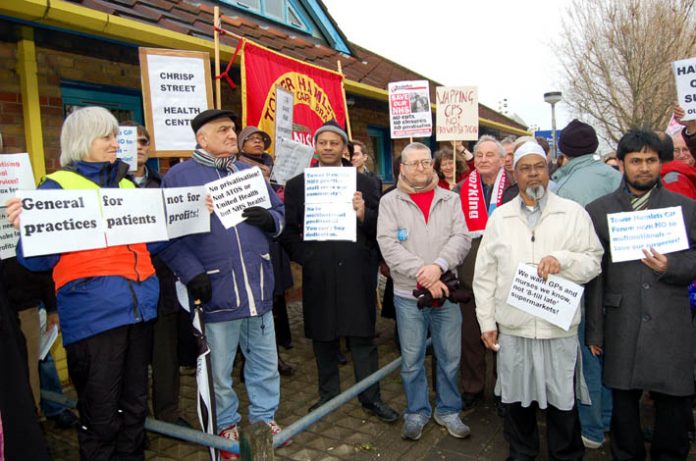
In a new attack on the NHS, the government is driving Primary Care Trusts (PCTs) to implement so-called ‘World Class Commissioning’, which involves selling off existing local NHS services to form new ‘markets’ of competing providers.
A new Department of Health ‘Cooperation and Competition Panel’ is being set up, which will intervene on behalf of private sector companies to force PCTs to put services out to tender, and prevent NHS Trusts and Foundation Trusts from collaborating and cooperating to provide a comprehensive service for local people.
The new panel is chaired by former private health and nursing home boss Lord Carter of Coles.
The scheme is being pushed through within a little-publicised ‘consultation’ due to close on April 30.
The Department of Health is also considering changing NHS rules to allow some GPs to sell ‘over-the-counter’ medical products to patients for commercial gain for the first time from their surgeries.
A DoH review document also suggests that a doctor’s formal approval may not even be required for the sale of over-the-counter (OTC) medicines, raising the prospect of GPs’ receptionists routinely selling products to patients.
As part of a review of the rules on pharmacies and the NHS, the DoH carried out an ‘impact assessment’ which concluded that GPs permitted to dispense prescription drugs should be allowed to ‘sell all OTC medicines to their full patient list where there is no convenient alternative’.
In, mostly rural, areas where there is not a convenient pharmacy, some 5,000 doctors are allowed to dispense prescription medicines themselves and accept the relevant fees.
But current rules prevent any NHS doctor selling OTC medicines, in order to make sure that decisions to recommend medication are based solely on clinical factors.
The DoH complains: ‘This is a barrier to self care in these areas and leads to an increased pressure on GP appointments that could be alleviated if the person could purchase their everyday medicines more conveniently.’
The assessment admits to a risk that the quality of service could deteriorate as a result of the change, warning of the danger of ‘supplier-induced demand’, where doctors push products at patients.
It says: ‘GPs could advise patients to purchase additional medicines in order to increase their profits from the margins that they make from selling OTC medicines.’
Excessive use of OTC medicines could lead to ‘suboptimal health outcomes for patients’, it also admits.
It also warns that patients in rural areas can be a captive market, with GPs able to dictate prices.
Nonetheless, the paper concludes that giving GPs a reason to sell OTC medicines to patients could have benefits including reducing the use of NHS-funded prescription drugs.
A Department of Health spokesman said that no decisions on GPs selling medicines has been taken. Ministers will give a formal response to the proposal ‘later this year,’ he said.
A BMA spokesperson said: ‘This proposal would benefit patients in very rural areas where there is no local pharmacy.
‘At the moment the only alternatives for these patients are to either pay £7 for a prescription of paracetamol or travel ten miles to the nearest supermarket.
‘However, we do not feel it would suit market towns or other areas where patients are within walking distance of a pharmacy.’